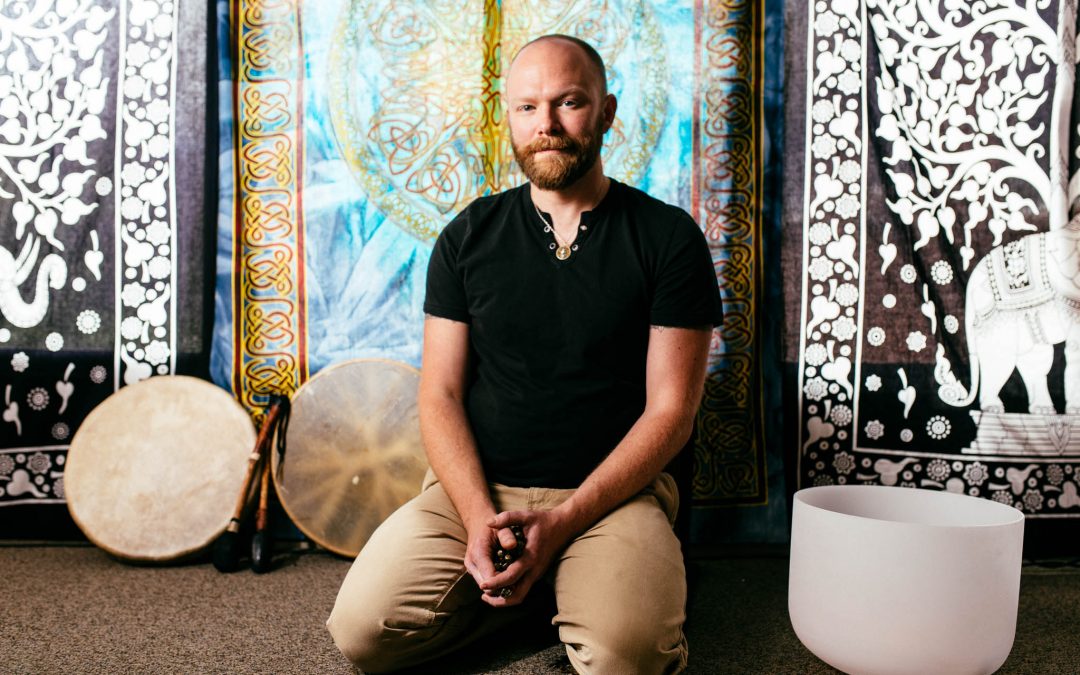My guest in this episode of the podcast is Daniel McQueen, psychedelic activist, community organiser, inovator, teacher, and author. Daniel is a founder of Center for Medicinal Mindfulness which was established in 2012. The center was among the first legal psychedelic plant medicine therapy clinics in North America.
At the clinic, Daniel and his team have developed some groundbreaking, effective and innovative modalities, including cannabis-assisted psychedelic therapy and cannabis-assisted psychotherapy. They also host regular breathwork sessions and community teaching around safe and ethical use of psychedelics.
More recently Daniel and his team have started offering training for those wanting to become involved in psychedelic healing. In 2019 Daniel published a book based on his work titled ‘Psychedelic Cannabis: Breaking the Gate’.
The Center for Medicinal Mindfulness is a clinic and a community promoting safe and intentional medicine use practises for personal and global healing and transformation.
Daniel is a leader, pioneer in psychedelic therapy and specifically using cannabis as psychedelic medicine and I’m grateful to have him on show.
Hope you enjoy this episode. If you like it please share it with your friends and leave a review so more people can join these types of conversations.
**
This episode is brought to you by Fulcrum Venture Accelerator, the fundraising accelerator for mission-driven entrepreneurs. Every 3 months Fulcrum scours the globe for the most impressive entrepreneurs building impactful companies, and takes them through a 3-month accelerator program focused 100% around helping them close seed financing.
Our process has already been used to close more than USD $22 million in seed capital and we’re just getting started. If you or someone you know is creating something impactful and is raising seed capital please visit Fulcrum to download free resources and get free pitch feedback.
Detailed Show Notes
6:35 Daniel talks about harm reduction: ‘‘Harm reduction with drug education is an alternative modality instead of an abstinence only modality. The idea is that you keep teaching people how to stay safe and healthy with medicines as they use them and to reduce the harm’’.
9:18 Daniel speaks about early “experiments” with cannabis they were conducting with their friends
10:20 Daniel explains how they started hosting online cannabis and breathwork sessions
13:51 Daniel discusses the difference between larger and smaller Conscious Cannabis circle groups: ‘‘60 people groups are rather large, what we do is we create these pods within the larger group, it makes it feel like a small group within the larger group’’.
16:57 Daniel: ‘‘Isolation causes trauma, and if you are not being seen or met by who you are and what deeply inspires you there is a deep grieving that occurs in people, and I would say that the number one intervention that we have is community’’.
20:35 Daniel: ‘‘Sometimes when we first become conscious of something that we don’t like about ourselves there is a natural tendency to project it on to someone else, so you can see it, so it can be your mirror’’.
24:06 Daniel explains what people might feel during the cannabis-assisted therapy: “Most people describe it as a psilocybin experience but with an emotional level of support that’s very similar to MDMA. It can be very inner visual, you have transpersonal experiences, unity consciousness experiences and such, but you don’t feel like you lose control”.
25:49 “You can even have ego disillusion experience and feel like you made that choice to have it every step of the way, which is super cool.”
26:46 “Your whole body is tripping in a way and that’s why we call it a somatic psychedelic.”
27:50 Daniel mentions Brigitte Mars, a herbalist from Boulder and his friend: “She believes cannabis was the tree of life, because some of the old images of the tree of life look like a big cannabis bush”.
29:17 Book by Joan Bello “The Benefits of Marijuana: Physical, Psychological and Spiritual”
32:17 Daniel discusses different cannabinoid compounds and molecules: ‘‘So we primarily work with three cannabinoids THC, CBD and CBN, but now CBG is coming out, CBC, THC Delta 8 is also a product that people are experimenting with, so cannabis medicines in the future are going to be very complex’’.
33:43 Will speaks about his cannabis experience and Daniel gives his perspective.
38:03 Daniel discusses ‘dosing’: ‘‘We call it subjective dosing because it’s so variable for so many people, so if I’m working with a regular smoker, it might be full bowl or two, that’s a pretty strong dose, but for person who never used before I invite them to take puff and then we sit for a few minutes, to see how they do, then invite them to take one more puff, maybe start to begin meditating or turning towards inner awareness, breathing in the belly… Then I invite them maybe to take one more puff. And at some point they say ‘I think I need to lay down’’’.
40:18 Daniel explains the difference between MDMA/psilocybin and cannabis: “With MDMA or psilocybin you just take it and that’s what you take and you wait for it to come on. With cannabis you can take a little bit, and just keep going deeper and deeper until you find that space that is therapeutic and deep enough. And if you want to go deeper, you just smoke more.”
43:10 Daniel: ‘‘Imagine having a full blown DMT trip that lasts three hours long but at any time you can take your eye covering off, sit up and you will be fully back. You will be lucid enough to go use the restroom, come back, lay back down without taking any more medicine, you can go back to the full DMT trip you were just having’’.
43:41 Daniel speaks about music he uses in sessions and how he live-mixes the music based on what the client needs to hear at the moment.
47:44 Daniel explains the role of the sitter in psychedelic therapy sessions and what it means to be a good sitter
52:43 Daniel addresses the constitution required to sit with people: ‘‘There is emotional resilience that is required beside physical and it takes a while to build this. It’s the ability to hear a story without disassociating. The ability to allow yourself to really accept that something terrible has happened to the person that is sitting in front of you in their past, and being able to stay in contact with that and not disassociating, because some of the things that people have lived through are traumatizing to even just hear’’.
57:09 Daniel: ‘‘It’s about how you navigate your emotions, so you feel it, it’s a normal human body physiological response, you let yourself fully feel it, you accept that it’s happening and that allows your energy to move fully through you, and then you re-regulate to your relax baseline’’.
57:58 Daniel: ‘‘If person wanted to scream for 20 years and never had a chance to scream, never felt safe to scream, and they really just needed to scream, that’s a release, that’s something that can be a life transforming, and if you suppress it then it shuts it back down and it get stuck again’’.
59:09 Daniel talks about how he decided to write a book: ‘‘I went to a psychedelics and philosophy conference in LA and I really got the fact that we were running out of time as a culture. I really felt inspired, I really needed to get this out, I can’t do this one on one or even a group of 60 people, there are too many people that need this work. The book teaches exactly how to make the blends, and then step by step instructions on how to bring these transformational healing practices into a solo journey experience, and how to do it safely’’.
1:03:13 Daniel discusses Cannabis as an illegal substance: ‘‘700 000 people have gone to jail just last year for cannabis, more people are going to jail for cannabis now than a few years ago, so it’s increasing’’.
1:05:15 Daniel talks about DMTx Program: ‘‘It’s using DMT in an extended state modality so that you can induce stable DMT states at varying levels for different therapeutic purposes, we have a whole team engaging in that. That program got hit pretty hard with Covid so it’s been delayed a little bit, but it’s ongoing and we’re going to be bringing some online training courses starting this year for all the people that are interested in becoming DMTx psychonauts’’.
1:06:51 Daniel talks about the origin of the DMTx Program and mentions Andrew Gallimore and Rick Strassman
1:10:39 Daniel: ‘‘There are technologies now that are actually being able to figure out and tap into intervisional experiences and represent them on computers, so that might be in our future’’.
Show Links
Center for Medicinal mindfulness: https://medicinalmindfulness.org/
Sitter Training program: https://psychedelicsittersschool.org/
DMTx program: https://www.dmtx.org/




Recent Comments